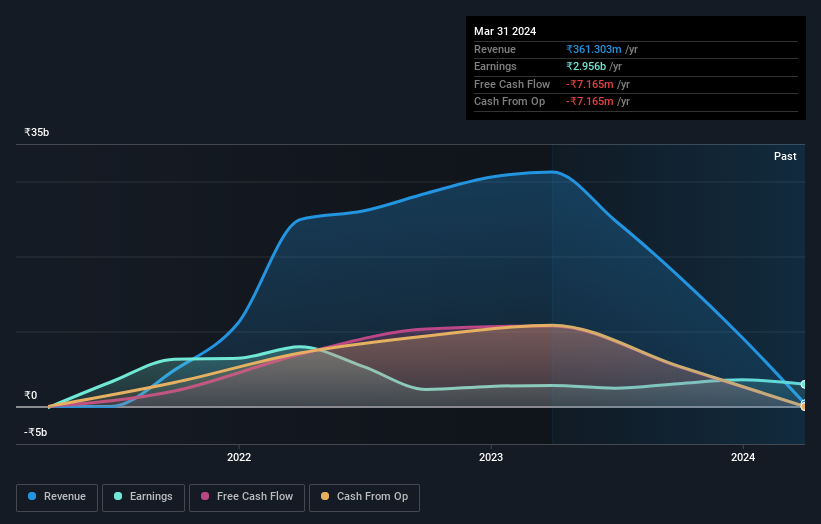- India
- /
- Capital Markets
- /
- NSEI:JPOLYINVST
Insiders are the top stockholders in Jindal Poly Investment and Finance Company Limited (NSE:JPOLYINVST), and the recent 11% drop might have disappointed them
Key Insights
- Jindal Poly Investment and Finance's significant insider ownership suggests inherent interests in company's expansion
- 51% of the company is held by a single shareholder (Shyam Jindal)
- Ownership research, combined with past performance data can help provide a good understanding of opportunities in a stock
If you want to know who really controls Jindal Poly Investment and Finance Company Limited (NSE:JPOLYINVST), then you'll have to look at the makeup of its share registry. The group holding the most number of shares in the company, around 81% to be precise, is individual insiders. That is, the group stands to benefit the most if the stock rises (or lose the most if there is a downturn).
As market cap fell to ₹8.4b last week, insiders would have faced the highest losses than any other shareholder groups of the company.
Let's take a closer look to see what the different types of shareholders can tell us about Jindal Poly Investment and Finance.
Check out our latest analysis for Jindal Poly Investment and Finance

What Does The Lack Of Institutional Ownership Tell Us About Jindal Poly Investment and Finance?
Small companies that are not very actively traded often lack institutional investors, but it's less common to see large companies without them.
There are many reasons why a company might not have any institutions on the share registry. It may be hard for institutions to buy large amounts of shares, if liquidity (the amount of shares traded each day) is low. If the company has not needed to raise capital, institutions might lack the opportunity to build a position. Alternatively, there might be something about the company that has kept institutional investors away. Jindal Poly Investment and Finance's earnings and revenue track record (below) may not be compelling to institutional investors -- or they simply might not have looked at the business closely.

Jindal Poly Investment and Finance is not owned by hedge funds. Looking at our data, we can see that the largest shareholder is Shyam Jindal with 51% of shares outstanding. This implies that they have majority interest control of the future of the company. Meanwhile, the second and third largest shareholders, hold 24% and 1.9%, of the shares outstanding, respectively.
While studying institutional ownership for a company can add value to your research, it is also a good practice to research analyst recommendations to get a deeper understand of a stock's expected performance. We're not picking up on any analyst coverage of the stock at the moment, so the company is unlikely to be widely held.
Insider Ownership Of Jindal Poly Investment and Finance
While the precise definition of an insider can be subjective, almost everyone considers board members to be insiders. The company management answer to the board and the latter should represent the interests of shareholders. Notably, sometimes top-level managers are on the board themselves.
Most consider insider ownership a positive because it can indicate the board is well aligned with other shareholders. However, on some occasions too much power is concentrated within this group.
Our most recent data indicates that insiders own the majority of Jindal Poly Investment and Finance Company Limited. This means they can collectively make decisions for the company. That means they own ₹6.8b worth of shares in the ₹8.4b company. That's quite meaningful. Most would argue this is a positive, showing strong alignment with shareholders. You can click here to see if those insiders have been buying or selling.
General Public Ownership
The general public, who are usually individual investors, hold a 19% stake in Jindal Poly Investment and Finance. This size of ownership, while considerable, may not be enough to change company policy if the decision is not in sync with other large shareholders.
Next Steps:
While it is well worth considering the different groups that own a company, there are other factors that are even more important. Be aware that Jindal Poly Investment and Finance is showing 2 warning signs in our investment analysis , and 1 of those is potentially serious...
Of course this may not be the best stock to buy. Therefore, you may wish to see our free collection of interesting prospects boasting favorable financials.
NB: Figures in this article are calculated using data from the last twelve months, which refer to the 12-month period ending on the last date of the month the financial statement is dated. This may not be consistent with full year annual report figures.
New: Manage All Your Stock Portfolios in One Place
We've created the ultimate portfolio companion for stock investors, and it's free.
• Connect an unlimited number of Portfolios and see your total in one currency
• Be alerted to new Warning Signs or Risks via email or mobile
• Track the Fair Value of your stocks
Have feedback on this article? Concerned about the content? Get in touch with us directly. Alternatively, email editorial-team (at) simplywallst.com.
This article by Simply Wall St is general in nature. We provide commentary based on historical data and analyst forecasts only using an unbiased methodology and our articles are not intended to be financial advice. It does not constitute a recommendation to buy or sell any stock, and does not take account of your objectives, or your financial situation. We aim to bring you long-term focused analysis driven by fundamental data. Note that our analysis may not factor in the latest price-sensitive company announcements or qualitative material. Simply Wall St has no position in any stocks mentioned.
Have feedback on this article? Concerned about the content? Get in touch with us directly. Alternatively, email editorial-team@simplywallst.com
About NSEI:JPOLYINVST
Jindal Poly Investment and Finance
Engages in investment activities in India.
Good value with acceptable track record.
Market Insights
Community Narratives



